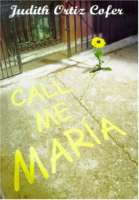
Maria is a girl caught between two worlds: Puerto Rico, where she was born, and New York, where she now lives in a basement apartment in the barrio. While her mother remains on the island, Maria lives with her father, the super of their building. As she struggles to lose her island accent, Maria does her best to find her place within the unfamiliar culture of the barrio. Finally, with the Spanglish of the barrio people ringing in her ears, she finds the poet within herself. In lush prose and spare, evocative poetry, Cofer weaves a powerful novel, bursting with life and hope.
- ISBN: 9780439385770
- Author: Cofer, Judith Ortiz
- Published: 2004 , Orchard
- Themes: adjustment, immigrant, Poetry, Puerto Rico
- Descriptors: Intermediate (ages 9-14), Realistic Fiction, United States
- No. of pages: 144

The format of the book was engaging for me-poetry, letters, and stories. I was able to better understand Maria’s feelings and thoughts. Her friends and teachers were great examples of how to embrace someone who is a newcomer.
I was sad when I saw that Maria had to choose between her parents. I know that many children, especially immigrant children have to face that choice, but there are also children who do not get to choose. Some students are forced to go with one or the other, while others are forced to live without one because of an illness or accident that takes that other parent away from them.
Being a child who was forced to live without a mother due to an illness, I have to look at the family history of my students and make sure that they are not going to be hurt by the stories we read in class. I would have to talk to students in my situation before assigning them to read this book, make sure they understand what it is about and have a second choice in case they choose not to read it.
I did like how the Puerto Rican culture was represented and how the author chose to leave a lot of room for interpretation as to why Maria chose to live with her father instead of her mother. It is hinted that it is so she can recieve the American education she dreamed of and so that she could care for her father, but the reason is never completely stated.
This was an interesting story, but I’m not sure I could use it with my third graders. I would definitely share exerts from the book while discussing similar topics with them. “Call Me Maria” was an inspiring story and I thought the format of the book was especially interesting. I hope to revamp my students journal writing next year with a similar layout in their journals!
Although Maria faced many difficulties in her life because she was from two worlds and had a specific situation, I feel that many young girls can relate to this book. It also an inspiring example of using writing as a way to express thoughts, feelings and emotions can be helpful.
How often do we have students who are torn between two parents, trying to please both and keep the family together? Maria demonstrated a lot of maturity as she cared for her father and pursued her American education. I think my students could relate to the split family and wanting to be in two places at once as many of them have both immediate and extended families in Mexico. It is so very important to keep in mind the struggles our students and their families are encountering and how that is affecting their learning. We need to know our students beyond the classroom if we truly want to make a difference.
Call Me Maria reminds me of immigrant students in my classroom who want to be accepted by their peers, but who also struggle to hold onto their primary culture. It’s inspiring to see how Maria uses language and poetry to express her confusion and uncertainty.
Maria’s struggle to find her place within her family and a new country is a wonderful example of the human spirit. She also showed us what it means to give and to take whether it was love for her father in taking care of him or the tenants or understanding her abuela’s words as those of love, but also reassuring Maria of the choices that she was making. This book was both heart breaking and inspiring. I loved the different formats that it was written in.
Call Me Maria is a visual text that enables readers to understand different aspects that are occuring in today’s society. With situations, like Maria’s, teachers should be encouraged to share stories of this nature with their students. It’s important that all students understand and be exposed to situations of other cultures and how families are different, or maybe the same. This text encouraged me to read further about family relationships and how I can integrate those into my classroom curriculum. I will take this text into the classroom as part of my multicultural library.
It is interesting that a young girl found that her place in the world was with her father in the barrios of New York City instead of with her mother in Puerto Rico. Maria had determination to stay with her father to care for him and to get herself an American education. I felt she really sees her place in the world and understands what she needs to do for her family as well as for herself.